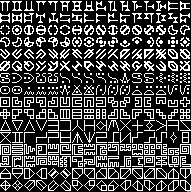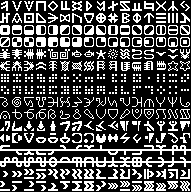Another short entry this week I’m afraid folks – as mentioned last week I’m coming to the end of my doctorate first draft, and that’s taking up pretty much all my time. I’ll be handing in the first draft some time towards the end of this month, so the latter half of February should see coding resume properly. Nevertheless, for this week I thought I’d say a bit about my current thoughts on in-game langauges. As mentioned in earlier post - and as you’ll see in the game – URR contains a bunch of different languages. In the current version of the game the game simply picks a language at random for each ziggurat and then implements them as simply one letter from the translation serving as one letter from the language itself, and since no language mechanics are yet implemented it just auto-translates. However, I’ve been thinking about what kinds of changes I want to make. It’s been proving tricky, however, to think of a language mechanic which is interesting, balanced, and wouldn’t just end up being bothersome. Some examples of the ideas I’ve considered:
- Your language learning level is an incremental %, and that % of words translate.
This was my original idea. You’d maybe acquire language knowledge in small parts by reading books, talking to NPCs or other things, and the higher the % the more words would translate. At first I thought this was a reasonable idea as it would mean even with a small amount of language knowledge you could still potentially make educated guesses. However, this seemed to have a bunch of problems. Firstly there would be a lot of components to learning a language (i.e. a lot of books or NPCs) – it might take a long time to learn a language in-game, and one that is only used for a single ziggurat. Secondly, I realized that it could lead to some very annoying gameplay situations. If you had 98% knowledge, for example, you could reasonably expect to be able to clear a dungeon… but if a single vital word was missing, it would still be impossible without a lot of guess-work, and potentially too much guess work to be still playable. This then raised questions about how common language-information would be, and a couple of other issues too, so this one got quickly ditched.

- You can learn a language in % chunks, say 25% at a time.
The next idea was much the same as the above, but in much more distinct chunks. Perhaps one could only learn a language to 0, 25, 50, 75 and 100%, so at anything below 100 you would know going into a dungeon that you were running a risk. I felt this removed both the problem of how many sources are there for learning languages (as now the answer would just be “not many”) and the risk of you completing almost an entire dungeon and then failing on a final key word (since 98% language knowledge would be impossible), but it just didn’t sit right with me. It still felt like an arbitrary barrier between the player and proceeding with the game’s story – you had to find language books or other sources of information before going anywhere. So…
- You either know the language (via a “dictionary” item), or you don’t.
Under this model language items would be very common – “dictionaries”, for example – but of a reasonably high price. Perhaps some would be very cheap, or the player would start with one if the player chose certain classes… but again, it was just an arbitrary barrier. Once you knew that dungeons would require some level of translation you’d still have to find your way to acquiring a dictionary beforehand, and that still seemed like a barrier to “progressing” with the game.
- A fourth option presents itself…
So, none of these have really worked out. I felt that the languages were both an important part of the world-building process, and could produce some very interesting and unusual gameplay… but I just couldn’t work out how. However, I think I’ve settled upon a good solution. Instead of making languages something the player character learns, I’m instead going to basically turn the languages into ciphers for the player to solve. Although the game is permadeath, I expect each playthrough to last for a length of time more akin to DF adventure mode even for new players, rather than the length of time a new player attempting Nethack is likely to survive before having everything stolen by a nymph and dying to a stray cat. It’s going to have much more of a feeling of developing your character over a longer period of time, and I think this will fit in nicely.

Some for early dungeons (such as ziggurats) are going to be very simple, perhaps only substitution ciphers, whilst the languages for the later dungeons will be much more complex ciphers. For the very late dungeons, perhaps they will be sufficiently tricky to solve that it might even require multiple players to work together to decipher the keys… and that, by my standards, would be a great success. Cryptography is a long-standing interest of mine and it’ll be fun to see how I can implement it into the game. I’m still working through the specifics, and this change won’t take place for some time, but that’s the long-term goal for languages. Next week (assuming there’s no more coding progress, which I fear will be the case) I may post a bit about some other longer-term goals, particularly the plot structure of the game, as I’ve had a few people asking about that and it may be useful to take stock of what exactly that’s going to entail.
Until next time you can keep up to date on my devblog, Facebook page, or Twitter feed. The devblog is updated weekly or fortnightly generally on Saturdays, Facebook a few times a week, and the Twitter roughly daily. Any thoughts, please leave them in the comments! Stay tuned...

Interesting stuff. Cool update.
Interesting ideas. However, I have to say that I think an in game learning mechanic would be better than forcing the player to do cryptography which isn't something everyone enjoys.
I know this is a RL and I am the first person to say that they should be really challenging, however cryptography is such a different skill/activity that it may be off putting to people who would otherwise enjoy the game. Mainly this is an issue because it seems such a big part of the game, and constantly having to decipher things isn't everyone's cup of tea.
All I mean by this is that having an alternative way to solve them would be good. Something like implementing one of the other methods AND the cryptography method together? That way the dedicated cryptographer could solve it themselves whilst someone uninterested in cryptography (or finds it very difficult) might need to buy an expensive dictionary/learn it innately.
@ Space, thanks! I have a few sketched out ideas for a couple of extra languages, but for the time being I'm sticking with those sixteen. I'm not sure how I'll distribute them in the world yet, though, so we'll see. That sounds like a very interesting language mechanic you're thinking about as well - I'm not sure about decaying language skills. I'd think about whether you want letters, or words, or entire types of words (like "trade" or "weapons" or whatever) to decay, and so on. As I wrote here, I ran into problems conceptualizing how best to "define" the bits of the language the player knows...
@ Jds, my thanks :).
@ Guest, I agree. I've had some interesting feedback today and have decided that for the "essential" parts of the game, the languages will either all be pretty simple, or have alternative ways to solve them. For the harder optional "challenge" areas of the game, however, all bets are off! For the very, very end-game optional areas, I think it would be interesting if they were sufficiently tricky it might actually take multiple players to crack. But yes, I totally agree - essential areas can have multiple solutions, challenge areas maybe less so.
Yeah, I really like the idea of cryptography being an optional way to solve language problems and that there could be alternative, more 'RPG' ways to build up your skills in different languages.
A mixture of dictionaries and experience would be my ideal way, especially if there were 'lost' languages which required very expensive/hard to get dictionaries, whilst more commonly known languages might be learned by interactions.
Probably the biggest problem with your last idea is solving a cryptograph takes the player out of the game. Pencil, paper, and Google suddenly become necessary.